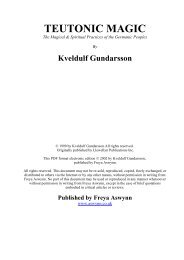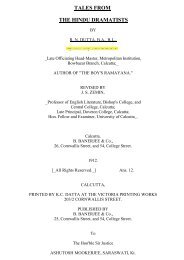Untitled - Awaken Video
Untitled - Awaken Video
Untitled - Awaken Video
You also want an ePaper? Increase the reach of your titles
YUMPU automatically turns print PDFs into web optimized ePapers that Google loves.
Chapter 6. The Sky 154<br />
usually took was loss of access to power/ luck, which in the above resulted in Glum’s<br />
loss of “a good name.”<br />
That the Gods were an objective reality, as opposed to internal or psychological<br />
constructs, seems to have been the only way of viewing them if one held any concept<br />
of them at all. The idea that Divine Powers are internal constructs seems to be a<br />
modern belief taken from interactions with Middle Eastern and Eastern philosophies<br />
such as Zen, Taoism, Sufism, or possibly some of the early Greek philosophies but did<br />
not play any real part in the indigenous northern European spiritual philosophies.<br />
The way of the North seems to relate most closely aligned with what the Tibetans<br />
call the “second Bardo” or the “realm of hallucination/ fantasies.” At present, the<br />
term “hallucination” has the unfortunate connotation “experiencing something that<br />
is not really there,” something not real. But, something is there: experience, particularly,<br />
personal experience. Many cultures, including the modern American (in spite<br />
of its negative view towards “hallucinations”), count personal experience as being<br />
of great importance (seeing is believing). Even modern psychology tends to treat<br />
some non-physical entities, such as “emotions,” as having an objective existence, i.e.<br />
outside the Self, so that they can be dealt with. The non- physical beings of the<br />
Northern European worldview, such as elves, trolls, wood- sprites, etc., were also<br />
dealt with objectively not because these people were ignorant, primitive barbarians,<br />
but, because in doing so, the universe was habitable, tolerable, and, in many cases,<br />
pleasant. Knowledge of the Gods, the World Tree, and the interactions between all<br />
forms of life, i.e., the entire Germanic world view, was a workable system and that<br />
is all that counted .<br />
It is difficult to determine exactly who the inhabitants of the sky regions were<br />
for the ancients. Both the Prose Edda of Snorri and the Poetic Edda indicate that<br />
the heavens were the realm of at least the Æsir (there is much evidence indicating<br />
that the Vanir were more closely associated with Midgard and the Underworld; see<br />
Chapter 5). 17 There are at least twelve “Halls” of the Gods listed by Snorri in the<br />
“Gylfaginning,” but Gladsheim is at one point called “the best [Hall] that is built on<br />
earth, and the biggest.” Njörðr, one of the Vanir and father to Freyr and Freyja,<br />
lives in Nóatún which is both in the heavens and near the ocean, and it is not very<br />
clear whether this Hall is associated with his ancestry as one of the Vanir or with<br />
His adopted ancestry as one of the Æsir. 18 Perhaps Snorri, writing 200 years after<br />
the official conversion of Iceland to Christianity, had his facts mixed up, or there<br />
may be a completely different explanation.<br />
17 H. R. is quite a heavy proponent of the idea that the Vanir, as well as the Álfar, are more<br />
concerned with the Underworld and Midgard. Indeed, her book Gods and Myths of Northern<br />
Europe (Penguin Books; Middlesex, UK, 1964) seems to be almost completely devoted to the<br />
topic.<br />
18 Snorri, pp. 15-58.
















